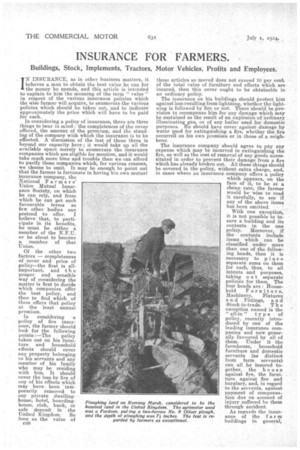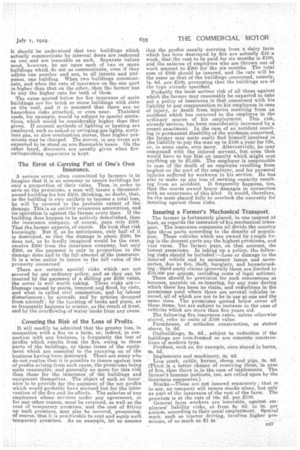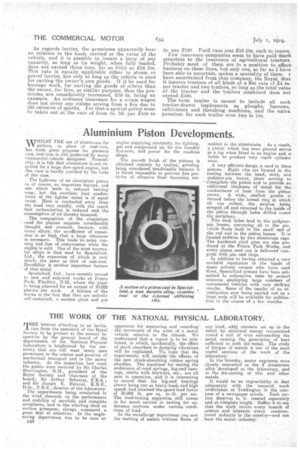INSURANCE FOR FARMERS.
Page 34

Page 35

Page 36

If you've noticed an error in this article please click here to report it so we can fix it.
Buildings, Stock, Implements, Tractors, Motor Vehicles, Profits and Employees.
IN INSURANCE, as in other business matters, it behoves a man to obtain the best value he can for the money he spends, and this article is intended to explain to him the meaning of the term " value " in respect of the various insurance policies which the wise farmer will acquire, to enumerate the various policies which should be taken out, and to indicate approximately the price which will have to be paid for each.
In considering a policy of insurance, there are three things to bear in mind : the completeness of the cover offered, the amount of the premium, and the standing of the company with which the insurance is to be effected. A .discussion of the last of these three is beyond our capacity here ; it would take up all the insurance companies space merely to enumerate the
Of the other two factors — completeness of cover and price of policy—the first is allimportant, and t h e proper and sensible way of considering the matter is first to decide which companies offer the best policy, and then to find which of them offers that policy at the least annual premium.
In considering a policy of fire insurance, the farmer should look for the following
points :—The policy taken out on his furniture and household effects should cover any property belonging to his servants and any member of his family who may be residing with him. It should cover the loss by fire of any of his effects which may have been -temporarily removed to any private dwellinghouse, hotel, boardinghouse, club, bank, or safe deposit in the United Kingdom. So long as the value of
those articles so moved does not execed 10 per cent. of the total value of furniture and effects which are insured, then this cover ought to be obtainable in an ordinary policy. The insurance on his buildings should protect him against loss resulting from lightning, whether the lightning is followed by fire or not. There should he provision to recompense him for any damage which may be sustained as the result of an explosion of ordinary illuminating gas, or of any boiler used for domestic purposes. He should have cover against damage by water used for extinguishing a fire, whether the fire occurrell on his own premises or in those of a neighbour.
The insurance company should agree to pay any expense which may be incurred in extinguishing the fire, as well as the cost of removal of any goods necessitated in order to prevent their damage from a fire which has already broken out. All these things should be covered in the policy, without extra charge, and, in cases where an insurance company offers a policy which appears, on the face of it, to be at a cheap rate, the farmer would be wise to read it carefully, to see if any of the above items has been omitted.
With one exception, it is not possible to insure a building and its contents in the one policy. Moreover, if the contents include items which can be classified under more than one of the following heads, then it is necessary to p lac e separate sums on them for each, thus, to all intents and purposes, taking o u t separate policies for them. The four heads are : HouseholdFurniture, Machinery, Fixtures a n d Fittings, a n d
Stock-in-trade. T h e exception named is the
" " ty p e of policy, recently introduced by one of the leading insurance companies and now generally favoured by all of them. Under it the farmhouse, household furniture and domestic servants (as distinct from farm servants) can all be insured together, the ho us e against fire, the furniture against fire and burglary, and, in regard to the servants, against payment of compensation due on account of injury suffered by them through accident.
As regards the insurance of the farm buildings in general,
it should be understood that two buildings which actually communicate by internal doors are reckoned as one and are insurable as such. Separate values must, however, be set upon each of two or more buildings which do not so communicate, even if they adjoin one another and are, to all intents and purposes, one building. When two buildings communicate, and when the rate of insurance on the one part is higher than that on the other, then the farmer has to pay the higher rate for both of them.
The rates quoted below for fire insurance of main buildings are for brick or stone buildings with slate or tile roof, and it is assumed that there are no hazardous risks attached, or even near. Thatched roofs, for example, would be subject to special quotations, which would be considerably higher than that given. If unusual methods of lighting or heating are employed, such as naked or swinging gas lights, acetylene gas, or slow-combustion stoves, then higher premiums may be charged. The stoves, in any event are expected to be stood on non-flammable bases. On the other hand, diacounts are usually given when fireextinguishing apparatus is kept.
The Error of Carrying Part of One's Own Insurance.
A serious error, often committed by farmers is to imagine that it is an economy to insure buildings for only a proportion of their value. Thus, in order to save on the premiums, a man will insure a thousandpound building for but £500, thinking, no doubt, that, as the building is very unlikely to become a total loss, he will be covered to the probable extent of the damage. This is an entirely erroneous assumption, and its operation is against the farmer every. time. If the building does happen to be entirely demolished, then the insurance company, of course, pays only 2500. That the farmer expects, of course, He took that risk knowingly. But if, as he anticipates, only half of it is destroyed, so that the damage is about 2500, he does not, as he fcndly imagined would be the case; receive £500 from the insurance company: but only .250, as the payment is only in proportion to the damage done and to the full amount of the insurance, It is a wise policy to insure to the full value of the property concerned.
There are certain special risks which are not covered by any ordinary policy, and as they can be insured by the payment of a shilling per 2100 value, the cover is well worth taking. These risks are :Damage caused by storm, tempest ansl flood, by riots, and what is called civil commotion, and by labour disturbances ; by aircraft, and' by articles dropped from aircraft ; by the bursting of tanks and pipes, as so frequently happens in winter, as the result of frost, and by the overflowing of water tanks from any cause.
Covering the Risk of the Loss of Profits.
It will readily be admitted that the greater loss, in connection with a fire on a farm, or, indeed, in connection with any business, is frequently the loss of profits which results from the fire, owing to those parts of the buildings, or those items of the equipment which are essential to the carrying on of the business having been destroyed. There are many who do not realize that it is possible to insure against loss of profits arising from such cause, the premiums being quite reasonable, and generally no more for this risk than those for the insurance of' the buildings and equipment themselveS. The object of such an insurance is to provide for the payment of the net profits which would probably have accrued but for the intervention of the fire and its effects. The salaries of any employees whose services under any agreement, or for any other reasons must be retained, as well as the rent of temporary premises, and the cost of fitting up such premises, may also be covered, presuming, of course, that it is practicable to rent and equip such temporary premises. As an example, let us assume that the profits usually accruing from a dairy farm which has been destroyed by fire are actually 210 a week, that the rent to be paid for six months is 2100, and the salaries of employees who are thrown out of work amount to 2200 for the six months. The total sum of 2800 should be insured, and the rate will be the same as that of the buildings concerned, namely, is. 6d. per £100, presuming that the buildings are of the type already specified. Probably the most serious risk of all those against which the farmer may reasonably be expected to take out a policy of insurance is that concerned with his liability to pay compensation to his employees in case of injury, or death from injuries resulting from an accident which has ()marred to the employee in the ordinary course of his employment. This risk, already serious, has been considerably increased by a recent enactment. In the case of an accident resulting in permanent disability of the workman concerned, the farmer may quite easily find himself involved in the liability to pay the man up to 2100 a year for life, or, in some eases, even more. Alternatively, he may compound with the injured servant, but even then would have to buy him an annuity which might cost anything up to 21,000. The employer is responsible in case of the death of an employee resulting from neglect on the part of the employer, and for personal injuries suffered by workmen in his service. He has also to make up any loss of earning capacity resulting from an accident. It frequently happens, too, that the courts award heavy damages in connection with an occurrence of this kind. It would, therefore, be the most absurd folly to overlook the necessity for insuring against these risks.
Insuring a Farmer's Mechanical Transport.
The farmer is fortunately placed, in one respect at least, as regards the insurance of his mechanical transport. The insurance companies all divide the country into three parts according to the density of population. Those vehicles which are owned by reople living in the densest parts pay the highest premiums, and vice versa. The farmer pays, on that account, the lowest premiums. In taking up a policy, the following risks should be included :—Loss or damage to the insured vehicle and to necessary lamps and a,ccessories, due to fire, theft, burglary, and housebreaking; third-party claims (generally these are limited to £10,000 per annum, including costs of legal actions). There should be proVision for such concessions as bonuses, payable on re-insuring, for any year during which there has been no claim, and reductions in the premiums, paid where 'there are several vehicles insured, all of which are not to be in use at one and the same time. The premiums quoted below cover all these items, but are subject to increase in the case of vehicles which are more than five years old. The following fire insurance rates, unless otherwise stated, refer to units of £100 value.
Farmhouse, of orthodox construction, as stated above, is. 6d.
Outbuildings, 2s. 6d., subject to reduction if the buildings are iron-framed or are concrete constructions of modern type. Produce, such as, for example, corn stored in barns, 6s. 6d.
Implements and machinery, 6s. 6d. Live stock, cattle, horses, sheep and pigs, 2s. 6d. (There is a better chance of removing these, in case of fire, than there is in the case of implements. The farmer's humane instincts, too, are relied upon by the ins.uranc,e companies.). •
Stacks.—These are not insured separately ; that is tossay, no company will insure stacks alone, but only as part of the insurance of the rest of the farm. The premium is at the rate of 10s. 6d. per £100.
General farm workers are insurable, against employers' liability risks, at from 28. 6d. to 55. per annum, according to their usual employment. Special work, such as tractor driving, involves higher premiums, of as much as 21 5s.
As regards lorries, the premiums apparently bear no relation to the loads carried or the value of the vehicle, and it is possible to insure a lorry of any capacity, so long as its weight, when fully loaded, does not exceed three tons, for so little as 216 10s. This rate is equally applicable either to steam or petrol lorries, but only so long as the vehicle is used for carting the owner's own goods. If it be used for haulage work, for carting the goods of others than the owner, for hire, or similar purpose, then the premiums are considerably increased, .C19 5s. being an example. An ordinary insurance for a steam wagon does not .cover any claims arising from a fire duo to the emission of sparks. For that a spacial policy must be taken out at the rate of from is. 3d. per 2100 to 2s. per £100. Ford vans cost 210 10s. each to insure.
Few insurance companies seem to have paid much attention to the insurance of agricultural tractors. Probably most of them are in a position to effect business on these lines, but only one, so far as I have been able to ascertain, makes a speciality of them. I have ascertained from that company, the Royal, that
it insures tractors of all kinds at a fiat rate cf 4iL per tractor and two trailers, so long as the total value of the tractor and the trailers combined does not exceed X500.
The term trailer is meant to include all such tractor-drawn implements as ploughs, harrows, cultivators and, threshing machines, and the extra premium for each trailer over two is 14s.














































